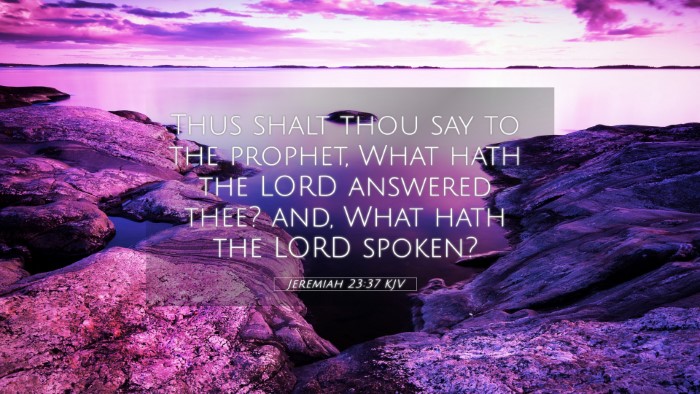Understanding Jeremiah 23:37
Jeremiah 23:37 states, "Thus shall you say to the prophet, What has the LORD answered you? And, What has the LORD spoken?" This verse serves as a directive for discernment regarding the words of the prophets. Here, the Lord is emphasizing the importance of verifying prophetic messages through inquiry and listening for the truth.
Summary of Meaning
The essence of this verse speaks to the ongoing dialogue between God and His people. Jeremiah, as the prophet, is instructed to call for accountability among other prophets. The focus is on discerning what the Lord truly speaks versus what is falsely proclaimed. This accentuates the need for spiritual vigilance and a commitment to seeking God's true message.
Commentary Insights
- Matthew Henry:
Henry emphasizes that every prophet should be questioned about their messages, highlighting the necessity of accountability in spiritual matters. The verse suggests a systematic approach to understanding divine messages, reminding believers to not accept teachings without scrutiny.
- Albert Barnes:
Barnes indicates that the Lord's question implies a need for verification of prophetic claims. He suggests that the faithful should be diligent in seeking divine truths. This inquiry promotes a culture of open dialogue regarding spiritual leadership.
- Adam Clarke:
Clarke reflects on the intent of the question posed to the prophets and advises that the response they provide should be weighed against the established word of God. This reinforces the idea of cross-referencing biblical texts to ensure the integrity of the proclaimed messages.
Cross-References
Jeremiah 23:37 connects with several other scriptures, forming a web of understanding about prophecy and accountability in spiritual communication. Here are some related verses:
- Deuteronomy 18:21-22: This passage discusses how to discern a true prophet by the accuracy of their messages.
- Ezekiel 13:3: The Lord condemns false prophets who prophesy from their own hearts and not from Him.
- 1 Thessalonians 5:20-21: New Testament teaching on not despising prophecies, but testing all things to hold on to what is good.
- Acts 17:11: The Bereans are commended for verifying the apostles' teachings against the scriptures.
- Matthew 7:15-20: Jesus instructs believers to recognize false prophets by their fruits, encouraging discernment.
- 1 John 4:1: Believers are advised to test the spirits to ensure they are from God.
- Jeremiah 23:16: A direct previous reference warning against false prophets.
Thematic Connections
The themes found in Jeremiah 23:37 emphasize the necessity of discernment, accountability, and truth in prophetic speech. By engaging in comparative Bible verse analysis, believers can explore how these themes manifest throughout Scripture.
- Discernment: The need to differentiate between divine truth and falsehood resonates throughout both the Old and New Testaments.
- Accountability: Prophets and teachers of the Word are expected to uphold truth and are accountable to the larger community of faith.
- Truthfulness of Prophecy: Consistently assessing prophetic messages against Scripture is a vital practice in both the early church and today.
Practical Application
In applying Jeremiah 23:37 today, believers are encouraged to engage with Scripture actively. Here are some guidelines:
-
Develop a Habit of Inquiry: Just as Jeremiah was instructed, ask questions about messages received from spiritual leaders.
-
Cross-reference Biblical Texts: Utilize tools for Bible cross-referencing and a Bible concordance to identify connections.
-
Study in Community: Engage in cross-referencing Bible study methods with fellow believers for deeper understanding.
-
Seek Guidance through Prayer: Ask the Holy Spirit for wisdom in understanding the truth behind prophetic claims.
Conclusion
Jeremiah 23:37, viewed through the lens of public domain commentaries, reveals the importance of discerning God’s word amid human interpretations. Utilizing the practice of inter-Biblical dialogue can enhance understanding and strengthen faith by exploring cross-referenced themes with a commitment to truth.
Further Study Suggestions
For those interested in exploring these biblical themes and cross-references further, consider the following:
-
Explore Bible Chain References: Utilize a comprehensive Bible cross-reference system for deeper connections.
-
In-depth Study on Prophets: Look into how prophets were perceived in both the Old and New Testament contexts.
-
Sermon Preparation: Analyze themes of discernment and accountability within your own preparatory work using Bible cross-references.


